India’s active Covid-19 cases have surpassed the 5,000-mark, reaching 5,364 as of Friday, 7 June 2025, with Kerala, Delhi, and West Bengal reporting the highest numbers. The recent rise is attributed to the emergence of new variants, particularly NB.1.8.1, though the majority of cases remain mild.
The Union Health Ministry, World Health Organization (WHO), and leading medical experts are urging the public to remain vigilant, continue mask use in crowded spaces, and ensure vaccinations—especially for vulnerable groups. While authorities stress there is no need for panic, they emphasise the importance of preparedness and responsible community behaviour.
Hotspots Respond with Enhanced Measures and Expert Guidance
Kerala continues to lead with 192 new cases in a single day, while Gujarat, West Bengal, and Delhi have also reported significant increases. Delhi’s active caseload now stands at 592, with no new deaths since Thursday.
Maharashtra and Tamil Nadu are seeing similar trends, with urban centres like Mumbai and Pune accounting for most new infections. Delhi Chief Minister Rekha Gupta has reassured citizens, stating, “Our hospitals are fully prepared, and we are closely monitoring the situation.”
Medical experts are echoing the call for calm but caution. Dr Soumya Swaminathan, former Chief Scientist at WHO, has advised, “Wearing masks in crowded or poorly ventilated spaces and practising good hand hygiene remain our best defences.”
Dr Diksha Goyal, infectious disease specialist at Marengo Asia Hospitals, adds, “Masks are a low-cost, high-impact tool that can significantly reduce transmission, especially as new variants emerge.” The Indian Medical Association has also recommended that those with flu-like symptoms seek testing and isolate as a precaution.
National and Global Response: Focus on Preparedness and Prevention
In response to the surge, the central government has directed all states to conduct mock drills in hospitals to assess readiness, focusing on oxygen supply, ventilator availability, and essential medicines.
Surveillance is being intensified for Influenza-Like Illness (ILI) and Severe Acute Respiratory Infection (SARI) cases, with positive samples sent for genome sequencing to monitor the spread of new variants. The ICMR has updated testing protocols, and the National Centre for Disease Control (NCDC) is closely tracking the NB.1.8.1 variant, now the predominant strain in India.
The WHO has released its new global action plan for 2025–2030, urging countries to integrate Covid-19 management with broader health services, prioritise early detection, and ensure equitable access to vaccines and treatments.
Indian experts strongly recommend booster vaccinations for the elderly, immunocompromised, and those with chronic illnesses, while pregnant women and healthy children are not currently advised to take the vaccine under the latest guidelines. States like Odisha and Karnataka have issued fresh advisories for schools and public spaces, encouraging mask use and isolation for symptomatic individuals.
States Reporting Positive Covid-19 Cases
As per the latest available data, the following states and union territories have reported active Covid-19 cases:
- Kerala: 1,487 active cases
- Delhi: 562 active cases
- West Bengal: 538 active cases
- Maharashtra: 526 active cases
- Gujarat: 508 active cases
- Karnataka: 436 active cases
- Tamil Nadu: 213 active cases
- Uttar Pradesh: 198 active cases
- Rajasthan: 103 active cases
- Haryana: 63 active cases
- Andhra Pradesh: 50 active cases
- Bihar: 31 active cases
- Madhya Pradesh: 30 active cases
- Odisha: 18 active cases
- Puducherry: 17 active cases
- Punjab: 16 active cases
- Sikkim: 9 active cases
- Assam: 8 active cases
- Jharkhand: 8 active cases
- Goa: 8 active cases
- Jammu & Kashmir: 5 active cases
- Uttarakhand: 6 active cases
- Chandigarh: 2 active cases
- Telangana: 3 active cases
- Himachal Pradesh: 1 active case
- Mizoram: 1 active case
- Chhattisgarh: 19 active cases
The Logical Indian’s Perspective
The recent spike in Covid-19 cases serves as a crucial reminder of our shared responsibility to protect one another, especially the most vulnerable among us. While the situation is being managed effectively and most cases are mild, complacency could undermine collective efforts.
The Logical Indian stands with health experts in urging everyone to follow public health advisories, get vaccinated if eligible, and support community initiatives to ensure healthcare systems are not overwhelmed. Let us continue to foster empathy, solidarity, and kindness as we navigate this evolving challenge together.













